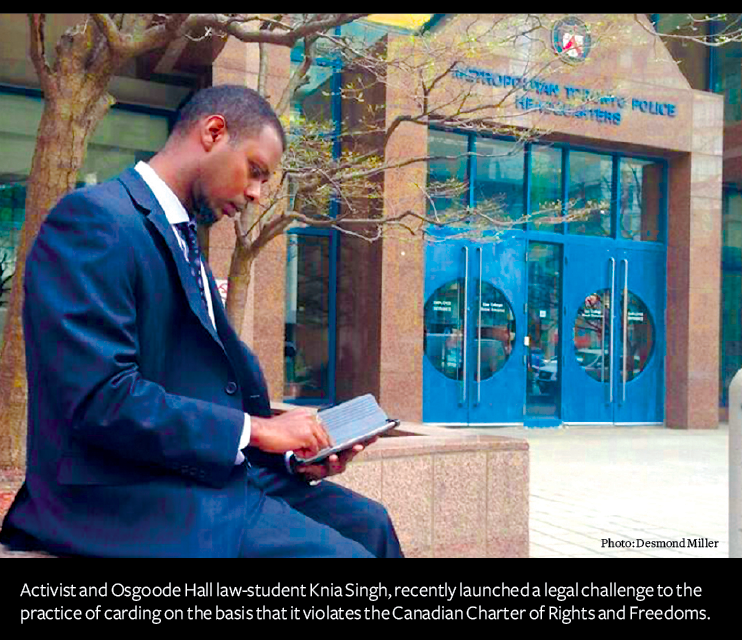By Desmond Miller
Few stories have gained as much media attention lately as the ongoing developments around the Toronto Police Services practice of “carding”. To focus on some of the main issues, and gain some clarity, I spoke with activist and Osgoode Hall law-student Knia Singh, who recently launched a legal challenge to the practice of carding on the basis that it violates the Canadian Charter of Rights and Freedoms.
Desmond Miller: For those who do not know, what is “carding”?
Knia Singh: Carding is the random, targeted stopping of people, who are not involved in criminal activity but are asked by police to provide personal information (for example, their name and address). That information is then placed in a police database.
DM: How did you become involved in speaking out against carding?
KS: I first became involved in speaking about carding in September 2013 when I, and a friend, Chris Williams, were featured in a story in the Toronto Star. I had no criminal record but when I filed a Freedom of Information request [with the Toronto Police] I received a fifty-page file. Ten pages was information gathered from contact cards. Much of the information was incorrect, such as my height and weight, even my place of birth, which was listed as “Jamaica” despite the fact that I was born in Canada. I am innocent, yet I have a record.
DM: What do citizens need to know about carding and why is it an important issue?
KS: Innocent people should never be stopped and intimidated or made to feel like they are forced to answer questions. The practice of carding could lead to a false charge and further complications in police interactions. Furthermore, it is important, in a free society, for Canadians to not have their rights violated. Carding violates Charter rights sections 7, 8, 9 and 15. And, it is targeted racial profiling that has a disproportionate effect on Black and Brown people.
DM: How can the practice of carding be challenged?
KS: If a citizen is stopped by police, it is important for them to know their rights and be polite and cooperative – even if their rights are being violated. Being rude could lead to other problems. If a citizen is carded, they can file a Freedom of Information request, challenge the information that police have and/or make police complaints.
DM: What do you think about the most recent developments regarding carding?
KS: Some positive steps forward have been made, including Mayor John Tory’s change in his stance on carding and the institution of the April 2014 policy (on carding), which limits some Charter rights violations. I am disappointed that this took so long and that (former Police Chief Bill) Blair did not put in this policy. I am also glad that the province (of Ontario) is stepping in and is developing a policy on carding and street checks.
What are your experiences with carding? E-mail us your stories at :
info@downsviewadvocate.ca


